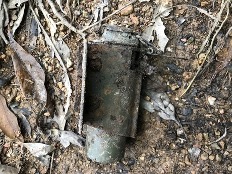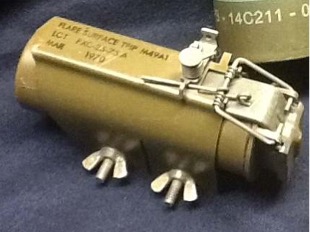| « RT Is Being Scapegoated For The US’ Global Soft Power Failures | Short Overview of Making Colonial Empires by European Powers from the Time of the Vienna Congress up to WWI (1815−1914) » |
Okinawan Governor Denny Tamaki Calls Out Crimes Committed by U.S. Military Personnel, New Henoko Base Construction, and PFAS
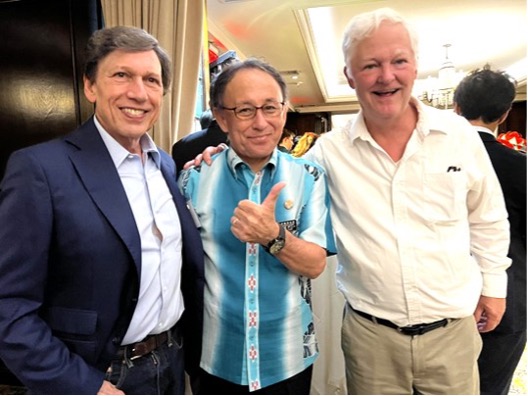
The great U.S. historian, Peter Kuznick, Governor of Okinawa Denny
Tamaki, and Pat Elder representing World BEYOND War.
By Pat Elder, World BEYOND War
DC event highlights Tamaki as an ally of the peace movement, despite restraints.
Okinawa Gov. Denny Tamaki is in Washington D.C. for the fourth time to voice Okinawan concerns to the U.S. government. Last night, the Washington Office of the Okinawan Prefectural Government hosted “Okinawa Night with Governor Denny Tamaki” at the City Club of Washington. I was asked to attend on behalf of World BEYOND War. My report follows.
The lavish event featured traditional Okinawan hors d’oeuvres and lively Okinawan dance and music. The event was attended by more than a hundred people, mostly representing DC-based NGO’s and academic institutions.
“This is my fourth visit to the U.S., in order to resolve the U.S. military base issues on Okinawa. I think it’s important that I come to the U.S. and directly convey my message to the U.S. government and appeal to them, especially in light of the situations surrounding Okinawa, including the recent series of sexual assaults committed by U.S. military personnel and the recent reinforcement of defense capabilities in the southwest islands, we believe that it is very meaningful to take this opportunity right before the presidential election to directly convey the actual situation in the Okinawa prefecture.”
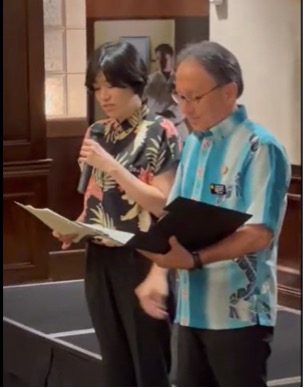
Gov. Tamaki briefly addressed those in attendance through an interpreter
He continued, “During this visit to the U.S., in addition to the felonious crimes committed by U.S. military personnel, the new Henoko base construction, PFAS issues, and the solid implementation of the U.S. Forces recommission we would like to appeal for efforts to ease tension and build trust through people diplomacy and dialogue so that Okinawa will never become a battleground.”
The island of Okinawa accounts for only .6% of Japan’s total land area, but hosts 70.3% of exclusive-use U.S. Force Japan facilities. Okinawa is about half the size of Rhode Island. The small island of Okinawa, which is home to over 90% of Okinawan archipelago’s population, accounts for about 15% of the total land area.
About 1.2 million live on the island. Gov. Tamaki says the existence of the U.S. bases in Okinawa is the biggest obstacle to the island’s economic development and that the situation is intolerable for the people of Okinawa.
Still, Tamaki says he agrees with the overall Japan-U.S. security arrangements, and he does not demand the closure of all the U.S. military bases.
Tamaki is, however, adamantly opposed to the relocation of Marine Corps Air Station Futenma to an area off the coast of Henoko in Nago City. He has demanded that the Air Station be relocated outside Okinawa.
The Okinawan people are in mourning over the desecration of Oura Bay and the ocean area around Henoko, a cherished and precious area that is home to dugongs and more than 5,300 species of life, including 262 endangered species. It’s a bummer. The Pentagon is desecrating the land and the sea here.

Protesters at the Henoko gate stop a convoy of 130 trucks from entering the base in August, 2024.
Tamaki says the Japanese government has blatantly disregarded the will of the Okinawan people. Tamaki’s warnings carry veiled threats. “If the two governments force ahead with the construction of the new Henoko base without gaining the understandings of the Okinawan people, who have suffered the excessive burden of hosting the U.S. military bases for so long, the furious opposition could well direct itself towards the U.S. forces and make the stable operation of other bases in Okinawa, including Kadena Air Base, difficult.”
2 + 2
The world has been slow to comprehend Japan’s dangerous bellicosity as evidenced in the Joint Statement of the Security Consultative Committee (“2+2”) on July 28, 2024. The four war hawks include US Secretary of State Blinken, Secretary of Defense Austin, Japan Minister for Foreign Affairs KAMIKAWA, and Minister of Defense KIHARA.
It is helpful to zoom out to grasp the geo-political context. The Americans are facing serious supply-chain obstacles in military armaments, having difficulty keeping up with the demand from Israel in its genocidal war in Gaza and its military campaigns in the West Bank, Lebanon, Syria, Yemen, and Iran. The U.S. has also been unable to completely meet Ukraine’s insatiable demand for weapons as it engineers drone strikes in Moscow.
This is the stuff that keeps U.S. war planners in the East Asian region awake at night. At this critical juncture in world history, Japan has agreed to step up to help the U.S. address its perceived shortage of weapons, especially concerning China, North Korean, and Russian influence in East Asia.
The Americans have prevailed on the Japanese to substantially increase their involvement in the purchase, production and deployment of U.S. weapon systems. This is why the so-called 2+2 communique announced on July 28 in Tokyo stressed the importance of a resurgent, militaristic Japan.
The U.S. and Japan announced plans to advance missile production capacity and to cooperate on new Patriot missile systems to assist in further militarizing Japan. U.S.-Japanese words and actions are ratcheting up tensions, especially, Japan’s about-face on the use of nuclear weapons. From the 2 + 2: “Given the increasingly severe security environment caused by recent moves of regional actors, the United States restated its unwavering commitment to the defense of Japan under Article V of the U.S.-Japan Treaty of Mutual Cooperation and Security using its full range of capabilities, including nuclear.”
The war planners know the lessons of these security agreements throughout history but are hell-bent in pressing forward. Can we expect the fleet of F-35’s at the highly contaminated Iwakuni Marine Corps Air Station near Hiroshima to be fitted with B-61 nuclear bombs? Will Iwakuni soon follow the path of highly contaminated and nuclear-armed Büchel Air Base, Germany in this regard? Both bases have contaminated water and fish with dangerous levels of PFAS.
Although Tamaki is an ally, he is likely to get in line in the case of military confrontation.
We can sense his subdued stance regarding last week’s report of a sexual assault on an Okinawan woman involving a 20-year-old U.S. Marine.
Sexual Assault
The way genocide in Gaza is becoming normalized, so too is sexual violence, mostly against women, wherever U.S. bases are located. We must demand that all charges of sexual abuse by U.S. service personnel be adjudicated by “host” countries. We must demand that the United States agrees to be subjected to the International Criminal Court in criminal matters.
Still, Tamaki is lukewarm in his condemnation, “As good neighbors in the same region, we need to know what is going on in the military side,” he told the Defense Writer’s Group in Washington. He explained, “We as our prefectural government, need to assure our citizens that we are actually protecting their lives and safety.”
Good neighbors don’t sexually assault each other. U.S. Forces are bad neighbors.
Tamaki has pressed the U.S. and the Japanese government to amend the Status of Forces Agreement to allow prefectural governments, like Okinawa’s, to be immediately notified of criminal behavior on the part of U.S. service members and to play a role in how the cases are adjudicated.
The implicated Marine is not in Japanese custody but is confined to military installations in Japan, Stars and Stripes reported. Gen. Ricky Rupp, commander of U.S. Forces Japan, offered a typical boilerplate response, “These incidents overshadow the friendship and professionalism we exhibit daily and do not reflect the intentions or actions of the preponderance of U.S. service members who serve honorably in this country.”
Go home, Gen. Rupp.
Dispatch from Akino Miyagi
Akino Miyagi lives near the Jungle Warfare Training Center at Camp Gonsalves, Okinawa. She is a passionate Okinawan activist who says the U.S. Marines are desecrating the fragile jungle environment located entirely within the protected Yanbaru National Park in northern Okinawa. The Marines have been training for anti-guerrilla operations here since 1958. (Think Panama, Cuba, Dominican Republic, etc.)
Akino collects waste from areas of the base that have been returned to the prefecture by the Marines. Akino has documented radioactive waste, unexploded ordinance, (UXO), and various hazardous materials littered throughout the area. The Okinawa Prefecture knew that U.S. military waste would remain littered throughout the jungle, but did not disclose it. Akino has been arrested and taken to court for various protests to publicize the U.S. military’s waste.
When she heard about the latest sexual crimes against Okinawan women by American soldiers. Akino went to work. She was arrested on September 6, 2024 for disrupting the U.S. Independence Day celebration hosted by the U.S. Territory of Okinawa. She was released on September 9, 2024.
This is her report:
In the midst of all this (sexual abuse), a U.S. Independence Day celebration hosted by the U.S. Consulate General in Okinawa was held at a hotel in Chatan Town on September 6, 2024, so we went to protest against the U.S. for holding a party that disregarded the feelings of the Okinawan people.
I thought that if I went there with just the clothes on my back, I would be quickly removed and would be unable to disrupt the celebration, so I decided to also carry an unexploded bomb to protest against U.S. military waste in the area that was being returned to us from the Northern Training Area.
The unexploded ordnance is a U.S. military tripping flare recovered from the former Northern Training Area, which was returned to Japan in 2016.
When we arrived at the hotel and looked around the entrance, we quickly realized that because it was a large hotel, protests from outside the premises would not be able to disrupt the celebration.
Once inside the building, we were able to easily get to the reception area of the celebration venue. There was no police security.
Also in attendance were the Marine Corps Band and Army soldiers in combat uniforms. When I saw that U.S. troops were there, I decided to protest.
After 5:30 p.m., I headed to the venue with a transparent pouch containing an unexploded bomb hanging from my neck.
“I came to give Consul General Andrew Ou some unexploded bombs from the U.S. military waste in the Yanbaru World Heritage Site. It’s an unexploded bomb from the U.S. military waste in the Yanbaru World Natural Heritage Site.”
“U.S. Military Grenade” I spoke in a loud voice.
At first, security guards and hotel staff responded, but after a while, about 30 uniformed police officers arrived in response to a call, confiscated the unexploded bomb, and removed it from the building.
At least seven police cars had arrived. I continued speaking to them even after I got outside the building (within the hotel grounds). The officers did not immediately arrest me, but instead invited me to speak to them in the police car. I continued to protest, suppressing my desire to get into the police car.
After a while, I was arrested. My smartphone was confiscated so I don’t have any photos of the event, but someone from the event was taking videos on their smartphone.
Stars and Stripes told half of the story.
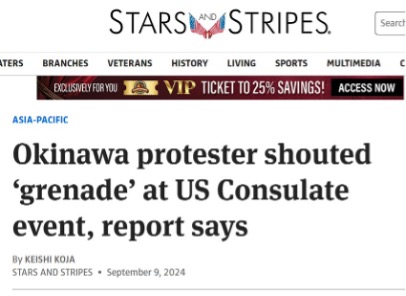
Akino asked me to relay her message to Governor Tamaki.
The governor, she said, should protest to the U.S. military and ask for entry to the site for investigation, since there is U.S. military waste being disposed of at the current northern training area as at the returned site in the same manner as before.
Tamaki Katsuya is the Deputy Director of the Okinawa Prefecture DC Office. We met after I ordered a beer. We had a great exchange. These guys are our allies. They don’t approach our level of outrage, but few do. I brought up Akino’s action and arrest, and I explained that her actions provided a way for her to bring the issue of residual U.S. military waste to the public’s attention and to ask how the prefecture will take responsibility for this.
The world we live in demands women like Akino step up.
And men too.
PFAS
Tamaki Katsuya said he had read my stories on PFAS, and that the governor saw it as an important issue, behind the continued sexual violence and the expansion of Henoko. I tried to impress upon him the calculations the U.S. EPA has done suggesting the PFOS (one type of PFAS) may bio accumulate in fish up to 4,000 times the levels of the carcinogen in the water. I told him we had tested surface waters draining from U.S. bases into the sea at 40 locations throughout Okinawa and the we had enough evidence to claim that the seafood caught from nearby waters is likely contaminated with tens of thousands of parts per trillion of PFOS while the Japanese government advises that drinking water be kept under 50 ppt.
Katsuya and I talked about the PFOS contamination of fish reported in the last Okinawa Prefecture’s DC Office newsletter. They reported on an excellent study by a group of researchers led by Professor Tashiro Yutaka of Meio University and Associate Professor Ito Takuma of Okinawa International University on PFOS in fish. The scientists found 10,000 parts per trillion in fish near Marine Corps Air Station Futenma. The concentration is 200 times greater than the Japanese advisory of 50 parts per trillion in drinking water. The Japanese and prefectural governments may consider funding further studies like this, along with studies that examine PFAS levels in places like the Kurashiki military leachate site that contains waste from Kadena Airbase, and all landfills that accept military waste. Wastewater from military bases ought to be examined for these deadly chemicals.
Women who are pregnant or may become pregnant should not be drinking contaminated water or eating contaminated fish – and neither should anyone else.
-###-
Okinawan Governor Denny Tamaki Calls Out Crimes Committed by U.S. Military Personnel, New Henoko Base Construction, and PFAS
https://worldbeyondwar.org/okinawan-governor-denny-tamaki-calls-out-crimes-committed-by-u-s-military-personnel-new-henoko-base-construction-and-pfas/
David Swanson is an author, activist, journalist, and radio host. He is executive director of WorldBeyondWar.org and campaign coordinator for RootsAction.org. Swanson's books include his latest: NATO What You Need to Know with Medea Benjamin. He blogs at DavidSwanson.org. He hosts Talk World Radio. He is a Nobel Peace Prize nominee, and U.S. Peace Prize recipient. Longer bio and photos and videos here. Follow him on Twitter: @davidcnswanson and FaceBook, and sign up for: Activist alerts or Articles.


